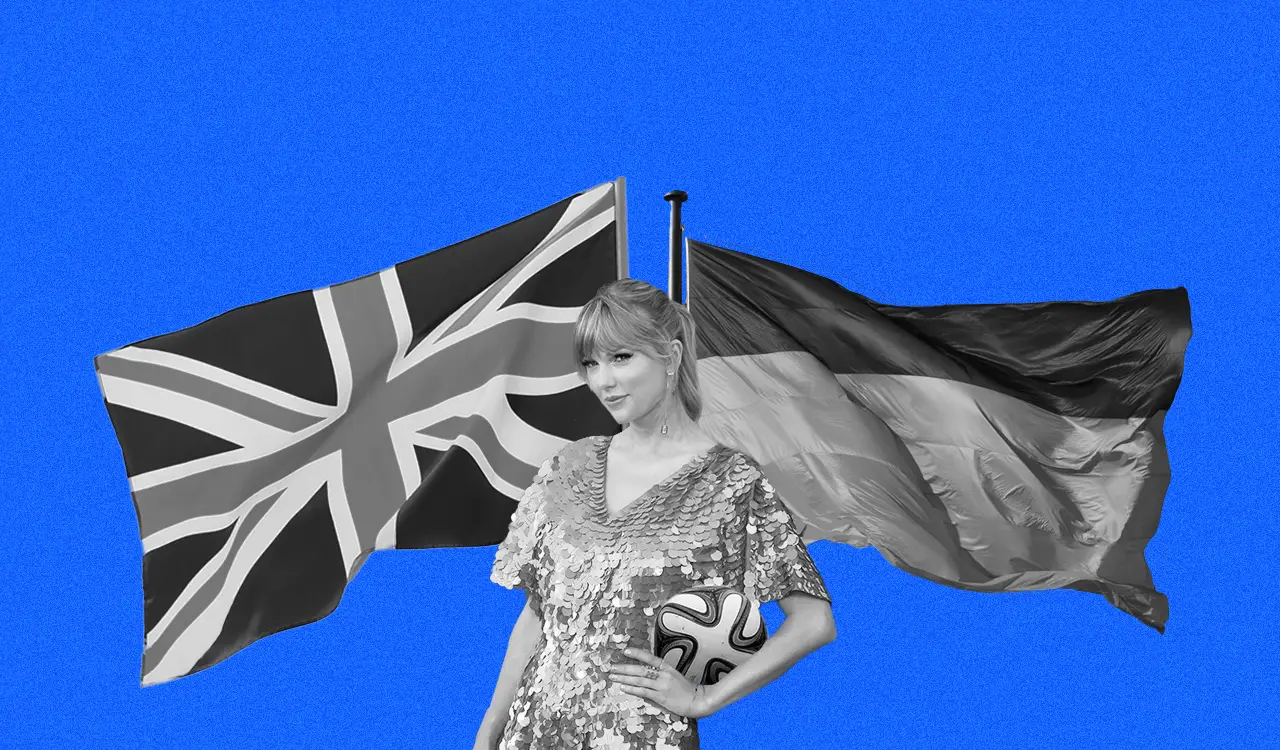This is set to be a huge summer for Europe’s embattled retail sector, with Euros, two major sporting events, and the arrival of Taylor Swift, all set to boost retail spending in host countries Germany and France, and Europe at large.
With 24 European countries having qualified for the tournament, all of whom will play a minimum of three games, the economic impact of the Euros will go far beyond Germany. Expectations for a boost to retail sales and hospitality venues in England are around $3.5 billion according to savings site VoucherCodes.co.uk, with 35.4 million people expected to tune into the tournament at home, bars, pubs, and restaurants.
The Sports Factor
Superstar Taylor Swift is already in Europe, having kicked off the European leg of her global Eras tour in Lyon, France, and is set to touch down in Scotland, England, Wales, Ireland, the Netherlands, Switzerland, Italy, Austria, Germany, and Poland, before concluding with a big finish for the summer in London in August.
Swift – and the Swiftonomics phenomenon– is renowned for the economic boost her concerts bring to venue host cities. But the really big news for European sports fans is the Euros soccer tournament, which will be held across a number of stadiums in Germany starting June 14 and running to July 14. It is expected to generate additional German retail sales of over $4.1 billion, according to the most recent estimates from the German Retail Association (HDE), with food and fan merchandise likely to be in high demand during the tournament.
Some 41 percent of respondents to its latest consumer survey said that they plan to purchase snacks, barbecue food, beverages, and other food items. Additionally, 31 percent intend to buy fan merchandise such as scarves, flags, and decorative items. In terms of spending, just under a third (32 percent) of those surveyed are also planning additional purchases of between $110 and $220; 28 percent expect to spend up to $110, while 8 percent plan to spend more than $500.
Sporting events have become massive money-makers. The World Cup held in 2022 in Qatar generated record-high revenues plus it was the most profitable in world soccer FIFA’s history — and earned the organization $7.5 billion over the four-year cycle. Unusually held over the traditional Christmas shopping period because of high summer temperatures in the Gulf state, Qatar’s GDP rose to a seven-year high of 4.5 percent in 2022.
Euros to Boost Continent’s Retail
Not surprisingly, the spending potential of the tournament is dependent on the performance of a German national soccer team that has so far blown hot and cold. A strong performance from the hosts is likely to bolster national morale and spending. However, some organizations are less positive, with the Ifo Institute’s business confidence indicator suggesting that only supermarkets, beverage retailers, and specialized sporting goods stores in Germany are likely to register any significant growth in sales. The most recent official data showed that retail sales in Germany declined more than expected in April, largely thanks to a slump in food sales. The think tank warned that the outlook for German retailers remains pessimistic.
With 24 European countries qualified for the tournament and a minimum of three games, the economic impact of the Euros will go far beyond Germany. Expectations for a boost to retail sales and hospitality venues in England are around $3.5 billion according to savings site VoucherCodes.co.uk, with 35.4 million people expected to tune into the tournament at home, bars, pubs, and restaurants.
It also estimates that U.K. retailers can expect to welcome 23.6 million shoppers through their doors, resulting in sales of $2.7 billion. This marks an increase of about $640 million over the 2022 World Cup. Spending on food and beverages for celebrations is expected to account for $1.8 billion of total sales, with many fans opting to watch at least one match at home, or someone else’s home.
Parisian Exodus
While German consumers seem hopeful, England’s fans remain typically convinced that “football is coming home” at long last. The French – or Parisians to be more precise – seem to be more, let’s say Gallic, about hosting the 2024 Summer Olympics. Luxury retailers are jostling to attract super-affluent customers in European cities outside of France who will travel to avoid the expected crowds and street closures in Paris.
“Paris will probably be slow,” with cities like London, Milan or Barcelona the likely beneficiaries of a lift in traffic during the event, Cartier CEO Cyril Vigneron said recently of the Games, which run from July 26 to August 11 (traditionally prime Parisian vacation time). Even LVMH, the world’s largest luxury group and an Olympic sponsor, has conceded that prior experience during the Olympics in London and Beijing suggests visits to Paris by affluent shoppers will be down.
A report commissioned by Paris 2024 flagged a possible “crowding out” effect whereby tourists who had previously planned Paris trips would go elsewhere. The Federation de la Haute Couture et la Mode has rescheduled the fall 2024 haute couture fashion shows to June 24 to avoid anticipated Olympics tourist chaos.
London retailers may be the beneficiaries of affluent European customers. Although London has been hit by a drop-off in tourist traffic because of a controversial government decision to end U.K. tax-free shopping, retailers are hoping to woo affluent international shoppers. “Paris has already been taken off the Chinese tour guide lists for this summer,” said Harrods’ managing director Michael Ward with what verged on unseemly glee.
Speaking at the World Retail Congress, held in Paris earlier this year, Ward stressed that Harrods was targeting a greater slice of global shopper business, and he will no doubt view any summer shopper defection from Paris as an opportunity. “Internationally, we believe we have to keep the DNA of the palace of Knightsbridge. So, we are looking at different ways to reach out to our customers, such as a member’s club in China and educational initiatives in Dubai,” he said at the Congress.
Swiftonomics Sweeps Europe
And holding steady in the background, if there is any way she can ever not be in the limelight, is the Taylor Swift Eras tour. Her economic impact has already been felt worldwide, with Australian fans moving domestic retail sales to a modest uptick in February, according to the Australian Bureau of Statistics (ABS) as Swiftonomics swept Down Under. It was a welcome, one-off hit as February retail spending totaled AUD$35.8 billion, up 1.6 percent the same month the year prior as Swifties poured into the country’s two biggest cities.
It’s a phenomenon that has become recognized worldwide, with U.S. cities from coast to coast experiencing a huge rise in retail, lodging, and food and beverage spending wherever the megastar appears. Swift’s Eras Tour has already become the highest-grossing tour on record, with revenues of over $1 billion to date, and the tour is not due to conclude until the end of this year.
The Eras Tour, which started last year, has been credited with boosting local economies across the U.S. Swift fans flocked to host cities across North America with numbers averaging around 54,000 fans per concert, spending an average of $1,327.74 according to analysis by Pollstar. After the singer-songwriter held three concerts in Chicago in June 2023, Illinois Governor J.B. Pritzker and local tourism leaders said that Illinois had broken its hotel revenue record thanks in part to Swift’s visit, with Chicago hotel occupancy reaching 97 percent.
Overall, one analysis by QuestionPro estimated the Eras Tour could generate $5 billion for the U.S. economy, while the U.S. Travel Association predicted that figure may come closer to $10 billion when factoring in the indirect spending of consumers who may not have actually attended the concerts but joined in on spending around the events.
Event Economics
This could hardly be a more pivotal year for European retailers. Two nearly month-long sporting events will garner interest from the vast majority of the continent’s countries, while Taylor Swift’s one-woman economic power will cross nations.
On top of that, the European Central Bank (ECB) chose the 80th anniversary of the D-Day Landings on June 6 to announce the first cut in five years in its main interest rate from an all-time high of 4 percent to 3.75 percent. And Christine Lagarde, president of the ECB, said that the inflation outlook had improved “markedly,” although she warned that inflation was likely to remain above the bank’s 2 percent target “well into next year,” averaging 2.5 percent this year and 2.2 percent in 2025.
Even a cautious cut coupled with cautious commentary will give Europe’s hard-pressed consumers – and by association the retail sector – a sense that it may, at last, be time to be rewarded with the Gold.





